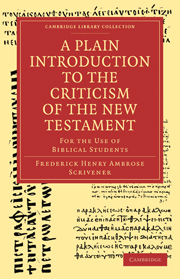Book contents
- Frontmatter
- ADVERTISEMENT
- ADDENDA ET CORRIGENDA
- Contents
- CHAPTER I PRELIMINARY CONSIDERATIONS
- CHAPTER II ON THE GREEK MANUSCRIPTS OF THE NEW TESTAMENT
- CHAPTER III ON THE ANCIENT VERSIONS OF THE NEW TESTAMENT IN VARIOUS LANGUAGES
- CHAPTER IV ON THE CITATIONS FROM THE GREEK NEW TESTAMENT MADE BY EARLY ECCLESIASTICAL WRITERS
- CHAPTER V ON THE EARLY PRINTED, AND LATER CRITICAL EDITIONS OF THE GREEK NEW TESTAMENT
- CHAPTER VI ON THE LAWS OF INTERNAL EVIDENCE, AND THE LIMITS OF THEIR LEGITIMATE USE
- CHAPTER VII ON THE HISTORY OF THE TEXT, INCLUDING A DISCUSSION OF RECENT VIEWS OF COMPARATIVE CRITICISM
- CHAPTER VIII ON THE PECULIAR CHARACTER AND GRAMMATICAL FORM OF THE DIALECT OF THE NEW TESTAMENT
- CHAPTER IX APPLICATION OF THE FOREGOING MATERIALS AND PRINCIPLES TO THE CRITICISM OF SELECT PASSAGES OF THE N. T.
- INDEX I
- INDEX II
- INDEX III
- Plate section
CHAPTER VIII - ON THE PECULIAR CHARACTER AND GRAMMATICAL FORM OF THE DIALECT OF THE NEW TESTAMENT
Published online by Cambridge University Press: 05 August 2011
- Frontmatter
- ADVERTISEMENT
- ADDENDA ET CORRIGENDA
- Contents
- CHAPTER I PRELIMINARY CONSIDERATIONS
- CHAPTER II ON THE GREEK MANUSCRIPTS OF THE NEW TESTAMENT
- CHAPTER III ON THE ANCIENT VERSIONS OF THE NEW TESTAMENT IN VARIOUS LANGUAGES
- CHAPTER IV ON THE CITATIONS FROM THE GREEK NEW TESTAMENT MADE BY EARLY ECCLESIASTICAL WRITERS
- CHAPTER V ON THE EARLY PRINTED, AND LATER CRITICAL EDITIONS OF THE GREEK NEW TESTAMENT
- CHAPTER VI ON THE LAWS OF INTERNAL EVIDENCE, AND THE LIMITS OF THEIR LEGITIMATE USE
- CHAPTER VII ON THE HISTORY OF THE TEXT, INCLUDING A DISCUSSION OF RECENT VIEWS OF COMPARATIVE CRITICISM
- CHAPTER VIII ON THE PECULIAR CHARACTER AND GRAMMATICAL FORM OF THE DIALECT OF THE NEW TESTAMENT
- CHAPTER IX APPLICATION OF THE FOREGOING MATERIALS AND PRINCIPLES TO THE CRITICISM OF SELECT PASSAGES OF THE N. T.
- INDEX I
- INDEX II
- INDEX III
- Plate section
Summary
1. IT will not be expected of us to enter in this place upon the wide subject of the origin, genius, and peculiarities, whether in respect to grammar or orthography, of that dialect of the Greek in which the N. T. was written, except so far as it bears directly upon the criticism of the sacred volume. Questions, however, are perpetually arising, when we come to examine the oldest manuscripts of Scripture, which cannot be resolved unless we bear in mind the leading particulars wherein the diction of the Evangelists and Apostles differs not only from that of pure classical models, but also of their own contemporaries who composed in the Greek language, or used it as their ordinary tongue.
2. The Greek style of the N. T., then, is the result of blending two independent elements, the debased vernacular speech of the age, and that strange modification of the Alexandrian dialect which first appeared in the Septuagint version of the Old Testament, and which, from their habitual use of that version, had become familiar to the Jews in all nations under heaven; and was the more readily adopted by those whose native language was Aramaean, from its profuse employment of Hebrew idioms and forms of expression. It is to this latter, the Greek of the Septuagint, of the Apocalypse, and of the foreign Jews, that the name of Hellenistic (Acts vi. 1) strictly applies.
- Type
- Chapter
- Information
- A Plain Introduction to the Criticism of the New TestamentFor the Use of Biblical Students, pp. 412 - 418Publisher: Cambridge University PressPrint publication year: 2010First published in: 1861



